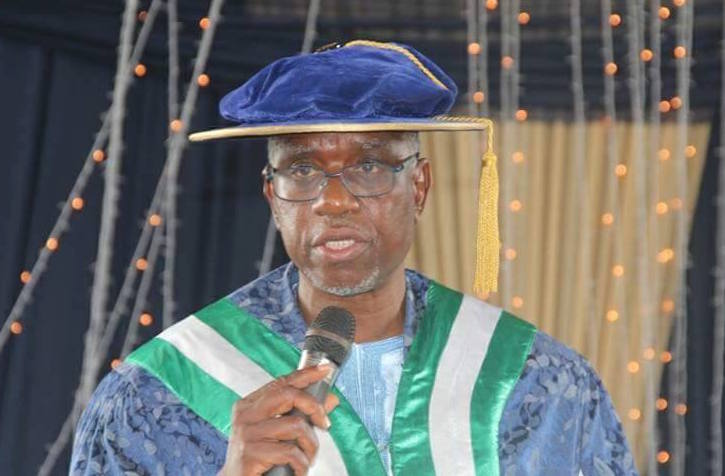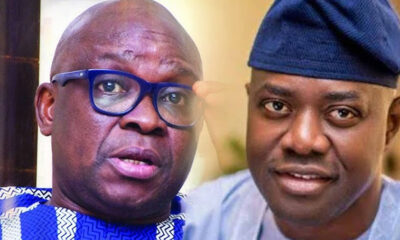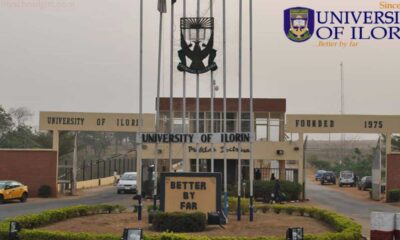Education
Why Nigerian varsities are not among world best — NUC

Poor funding is the main reason Nigerian universities are not ranked among the best in the world, Executive Secretary of National Universities Commission, NUC, Prof. Abubakar Rasheed, has said.
He however said the commission was planning to put in place stringent measures to curtail the proliferation of universities, especially by state governors and ensure adequate funding for universities.
The Senior Staff Association of Nigerian Universities has also lamented that teaching staff are taking over their jobs through the composition of committees by the university management where the teaching staff are made to head such committees.
The NUC executive secretary spoke in Abuja when the leadership of SSANU paid him a visit in his office, in Abuja, the NUC Executive Secretary advised the association to ensure that any time it was entering into any agreement with the Federal Government, such an agreement should be one that will be implementable.
Explaining why Nigerian universities were not among the highly ranked universities in the world, Prof Rasheed said funding had become a key challenge.
He said, “Once a university loses reputation, it has lost everything. The NUC may come up with stringent measures on establishing state universities because some of the state-owned universities are not well funded.”
He noted with regret that in a particular university in the South-South, the state government released to the management about N452 million to run the institution in the previous year, and later slashed the money the next year to N91 million, with a further slash to N40 million.
“I am not sure they are paying salary to staff regularly. Some private universities are sick already,” he said, pointing out that a particular private university had not paid salary to staff for one and half years.
On the concern raised by SSANU President, Comrade Mohammed Ibrahim, who led the delegation that state governors were proliferating universities as if it had become a constituency project, the NUC boss said the governors were interested in leaving a legacy but not investing in the established universities.
He, however, expressed optimism that the new NUC Act would give the commission more powers, unlike the existing one, adding that there should be a master plan to be submitted and approved by the commission before any new university was established.
He debunked the claim that some of the commissions set up by the NUC in the universities were dominated by teaching staff, against non-teaching staff.
Speaking earlier, SSANU President, Comrade Ibrahim, lamented that some of the jobs meant for non-teaching staff were being taken over by teaching staff.
He said the association believed in excellent service and doing things in the right way, adding that the voices of members of SSANU would only be heard when necessary.
He said, “Our members are becoming more and more troubled by the recent developments coming out of the university system. Our members’ jobs are being taken over by so many committees in the universities.
“There is the issue of non-payment of salaries, especially for our members in state universities. Some have not received salaries for up to six months, yet we hear that NUC is giving accreditation to new state universities.
“NUC should ensure that our members are not languishing in their offices. We are also disturbed over the negative development of nonuniformity in the conditions of service in the universities. This is happening to the morale of our members. We call for a uniform standard in the universities.”

Education
ASUU, FG Reach New Agreement, Approve 40% Salary Increase from 2026

ASUU, FG Reach New Agreement, Approve 40% Salary Increase from 2026
The Academic Staff Union of Universities (ASUU) and the Federal Government of Nigeria have concluded negotiations on the renegotiation of the 2009 ASUU–FG agreement, with the new deal scheduled to take effect from January 1, 2026.
ASUU disclosed this in a statement published on its official Facebook page on Wednesday, announcing that the agreement was finalised on December 23, 2025, after prolonged negotiations. According to the union, the agreement will be reviewed every three years.
The renegotiated agreement places strong emphasis on improved welfare for university lecturers and enhanced funding for public universities. Key provisions include a 40 per cent salary increase for academic staff and significantly improved pension benefits.
READ ALSO:
- Brain Drain Deepens as 16,156 Nigerian Nurses Secure UK Licences Since 2017
- Sheikh Gumi Drags Two to Court Over Alleged Fake Threat Against Defence Minister
- Lagos Fire Service Battles Blaze at 25-Storey Great Nigeria Insurance House
Under the new terms, professors will earn pensions equivalent to their annual salary upon retirement at the age of 70, a move ASUU described as a major boost to post-service welfare in the university system.
The agreement also introduces a new funding framework for public universities, with dedicated allocations for research, libraries, laboratories, equipment, and staff development. A National Research Council is to be established to drive research and innovation, with funding pegged at a minimum of one per cent of Nigeria’s Gross Domestic Product (GDP).
Other provisions include strengthened university autonomy and academic freedom, the election of academic leaders such as deans and provosts restricted to professors, and assurances that no academic staff will be victimised for participating in past industrial actions.
ASUU urged the Federal Government to ensure the prompt and faithful implementation of the agreement, while also calling for the extension of similar negotiations to other university-based unions in order to promote lasting stability in Nigeria’s university system.
ASUU, FG Reach New Agreement, Approve 40% Salary Increase from 2026
Education
NOUN Student Dies After Collapsing During Examination at Victoria Island Centre

NOUN Student Dies After Collapsing During Examination at Victoria Island Centre
A student of the National Open University of Nigeria (NOUN), Michael Coker, has reportedly died after collapsing during an examination at the institution’s Victoria Island study centre in Lagos.
The tragic incident occurred around 11 a.m. on Tuesday, December 16, while students were preparing to sit for an examination. Witnesses said Coker suddenly collapsed inside the examination hall and allegedly lay unattended for several minutes while gasping for breath.
A fellow student, identified as Bukola, alleged that a female senior lecturer and invigilator prevented students from assisting the distressed student.
“It happened shortly after we entered the hall. Coker was standing when he suddenly collapsed. Another student held him and laid him on the floor,” Bukola said.
She claimed that the invigilator from a nearby hall ordered students to return to their seats instead of attending to the collapsed student.
“She kept chasing everyone away to continue writing the exam, even though he was on the floor gasping. When told a student had collapsed, she said in Yoruba, ‘E fi sílẹ̀, ó máa dìde’ (Leave him; he will get up),” Bukola alleged.
READ ALSO:
- Ojuelegba Bridge Gridlock as Container Truck Overturns in Surulere, Lagos
- Troops Foil Kidnapping on Otukpo–Enugu Expressway, Rescue Passengers in Benue
- Davido Joins Accord Party, Aligns With Uncle, Osun Governor Ademola Adeleke
According to her, Coker reportedly remained on the floor for over 15 minutes, during which students expressed concern and attempted to understand his condition, but were repeatedly stopped.
“It took several minutes before help came. Even moving him to a chair took another five minutes. By then, his breathing was very bad,” she said.
Bukola added that a nurse later arrived, administered first aid, and Coker was taken downstairs via an elevator. Students were reportedly instructed to continue with their examination and were only informed after the exam that Coker had died.
Another student and class representative, Prince Preskit, confirmed that Coker collapsed while attempting to log into the examination system.
“I think the invigilator initially wanted people to give him space. When it became obvious that it was serious, he was taken downstairs and rushed to the hospital,” Preskit said.
He disclosed that Coker was taken to Bonny Camp Hospital, but later died while being moved to another medical facility.
However, Bonny Camp Hospital denied claims that it rejected the student.
“The patient was not rejected,” a hospital official told Punch. “He was referred to another hospital where oxygen would be available.”
The incident has since sparked outrage among students, with many calling for a thorough investigation into the handling of the emergency during the examination.
NOUN Student Dies After Collapsing During Examination at Victoria Island Centre
Education
FG Spends Over ₦150bn on 788,000 Students Through NELFUND — Information Minister

FG Spends Over ₦150bn on 788,000 Students Through NELFUND — Information Minister
The Federal Government has disbursed over ₦150 billion to support about 788,000 students under the Nigeria Education Loan Fund (NELFUND) initiative, the Minister of Information and National Orientation, Alhaji Mohammed Idris, has disclosed.
Idris made this known on Monday in Abuja during the end-of-year media briefing, where he highlighted key achievements of President Bola Tinubu’s administration, particularly in the education sector.
According to the minister, 2025 marked a major milestone in targeted policy formulation and implementation, with a strong focus on empowering young Nigerians.
“NELFUND has now supported over 788,000 Nigerian students with interest-free education loans and stipends amounting to over ₦150 billion, and the figure is still increasing,” Idris said.
READ ALSO:
- US Offers $3,000, Free Flights to Undocumented Migrants Who Self-Deport Before Year End
- Presidency Denies Altering Tax Laws as Reps Probe Alleged Changes to Tinubu-Signed Bills
- Akpabio Raises Hope for Ibadan State Creation During Visit to Olubadan
He also announced that the Federal Government’s Investment in Digital and Creative Enterprises (iDICE) programme officially took off in 2025, backed by a multi-million-dollar venture fund aimed at boosting creative and digital entrepreneurship among Nigerian youths.
In addition, Idris revealed that the government launched the Student Venture Capital Grant (S-VCG) during the year.
According to him, the S-VCG provides equity-free funding of up to ₦50 million to undergraduate innovators in Science, Technology, Engineering, Mathematics, and Medicine (STEMM) disciplines across accredited tertiary institutions.
“With this intervention, Nigeria is nurturing entrepreneurship on its campuses and turning some of its brightest minds into job creators rather than job seekers,” he said.
The minister further noted that the Three Million Technical Talent (3MTT) programme recorded significant progress in 2025, as the government continues efforts to build Africa’s largest digital talent workforce.
FG Spends Over ₦150bn on 788,000 Students Through NELFUND — Information Minister
-

 Entertainment3 days ago
Entertainment3 days agoBreaking: Popular Nigerian Actress Allwell Ademola Dies at 43
-

 metro2 days ago
metro2 days agoIbadan Explosion: Fayose Releases Documents, Claims Makinde Got ₦50bn from FG
-

 Sports1 day ago
Sports1 day agoCristiano Ronaldo Wins Best Middle East Player at 2025 Globe Soccer Awards in Dubai
-

 metro1 day ago
metro1 day agoNiger Delta Crackdown: Army Seizes ₦150m Stolen Oil, Arrests 19 Suspects
-

 metro2 days ago
metro2 days agoPlateau Kidnappers Demand ₦1.5m Each as 28 Muslim Travellers Remain in Captivity
-

 Opinion2 days ago
Opinion2 days agoHow a Misleading Channels TV Headline Reignited Nigeria’s Religious Tensions
-

 Sports1 day ago
Sports1 day agoAnthony Joshua injured as two die in fatal Lagos-Ibadan Expressway crash (plus photos)
-

 Entertainment3 days ago
Entertainment3 days agoCarter Efe Slams Peller’s Suicide Attempt, Urges Him Back to Streaming After Jarvis Breakup















